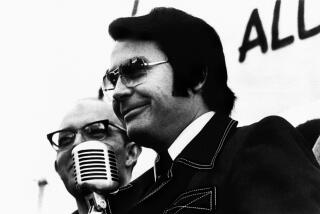Self-Help Tapes: Praised by Users but Derided by Many Experts
- Share via
NEW YORK — For just $9.98, you can enlarge your bust, refine your golf game, soothe your loneliness, heal your acne, restore your hearing--or get your money back, guaranteed.
That, and much more, is what millionaire hypnotist Barrie Konicov claims that you can do after tuning in to his Self-Hypnosis/Subliminal Persuasion cassette tapes.
He sold between 3 million and 5 million of them worldwide in 1987 and is a leader of the booming U.S. self-help market that took off in the 1970s with the publication of hundreds of books on coping with depression, obesity, loneliness and scores of other psychological and physical problems.
In the 1980s, entrepreneurs also began to market audiotapes, video programs and even computer-assisted self-help treatments.
Little Testing
But psychologists and lawyers say few, if any, of the devices have been scientifically tested to ensure that their effectiveness match the claims on their packaging.
In what may be among the industry’s more sensational claims, Konicov, who holds a graduate degree in business, vows that those who listen to his tape “Natural Bust Enlargement” can become as buxom as they wish within months.
“And this is true,” the bald 48-year-old former encyclopedia salesman guarantees, or he’ll refund the $10 cost of the tape.
Konicov spills soporific messages onto 160 recordings, promising in a soft monotone: “Should you fall asleep during the tape, you can still receive and benefit from the entire program, since your subconscious mind never sleeps.”
Psychologists Making Tapes
That’s nonsense according to most psychologists, some of whom purvey their own dubious self-help therapies.
Even the American Psychological Assn. has entered the marketplace with untested audiotapes, according to Dr. Gerald Rosen, a psychologist who chaired an APA task force on ethical issues in the self-help field.
“In a certain way, some people may be helped by the positive suggestions in (self-help devices), but the actual results are far less than the claims,” Rosen said.
After a 3-day course at the Ethical Hypnosis Training Center of South Orange, N.J., Konicov was so confident in the effectiveness of his hypnotic spell, for example, that he branded each of his tapes with the warning: “Do not play the self-hypnosis side of this tape while driving an automobile.”
Subliminal Persuasion
The cassettes’ flip side is labeled Subliminal Persuasion, the theory that hidden messages can persuade or manipulate the recipient of the message.
This contention was popularized in the 1970s by Wilson Bryan Keyes, who wrote the book “Subliminal Seduction,” which pointed to phallic suggestions in ice cubes and other hidden messages in advertising that he said manipulated the viewer.
Made inaudible by a blend of music and crashing waves, Konicov’s hidden, or subliminal, messages are designed to penetrate the listener’s subconscious.
“You get the subconscious believing the same thing as your conscious,” explains his daughter Stephanie, vice president of Konicov’s Michigan-based company, Potentials Unlimited Inc.
Most psychologists have dismissed this type of subliminal persuasion as harmless quackery. But some say the overall effect of the tapes, and devices like them, can be harmful.
“It’s dangerous if you think it’s going to do something,” said Frederick Koenig, a professor of social psychology at Tulane University in Louisiana. People who feel depressed or anxious or are trying to quit smoking, for example, may get even tenser if they blame themselves instead of the devices for failing to achieve their goals.
Alan Shefling, a lawyer with a graduate degree in psychology who teaches classes on persuasion at Santa Clara University Law School in California, said: “If it’s just like a pep talk, there’s no problem, but if they start using words like ‘depression’ and ‘anxiety’ then they touch on the problem of medicine.”
The recordings may be improper treatment for an ailment that has not been professionally diagnosed.
In 1982, more than 20 Konicov tapes were seized by the U.S. Food and Drug Administration because he had made medical claims that were not supportable by scientific evidence. Many were allowed back on the market with more realistic claims.
Testimonials by Users
Tapes and self-help books with very specific medical or psychological treatment claims “may be subject to the same liabilities as a pill,” said Rosen, a clinical professor at the University of Washington Medical School.
Professional warnings notwithstanding, many Americans who have tried the tapes vow that they work.
“They really do,” said Sue Villamin, 45, of Seattle. She owns 25 Konicov tapes, including “Up From Depression,” “Stop Being Angry,” “Freedom From Guilt” and “Weight-Loss,” which helped her shed 15 pounds.
“I like the man who made the tapes. His voice is very soothing, very relaxing,” she said.
Potentials Unlimited says 85% of its sales are to repeat customers.
“I love them,” said Jean Lemanski, 40. “They give you a positive attitude, good self-image and confidence.” In her Michigan home, she has set up a sort of library to lend tapes to her friends and associates who cannot afford to buy them.
More to Read
Sign up for Essential California
The most important California stories and recommendations in your inbox every morning.
You may occasionally receive promotional content from the Los Angeles Times.













